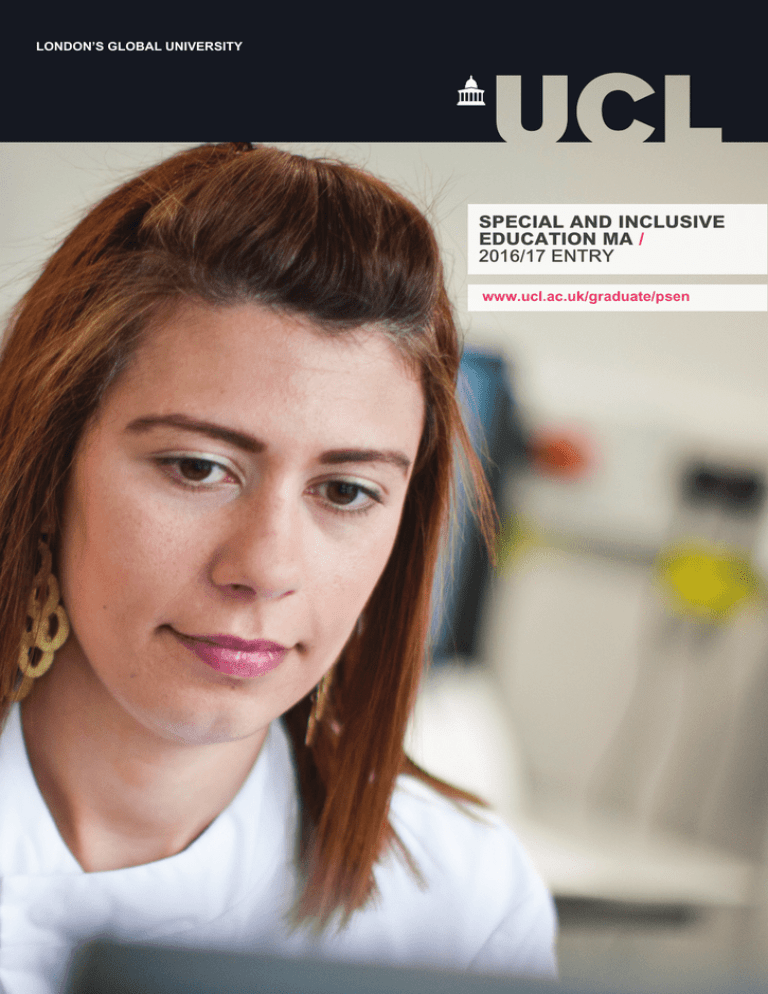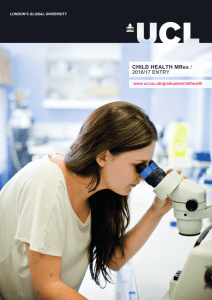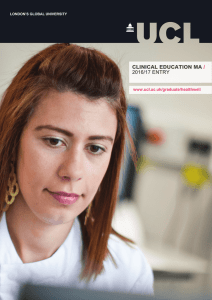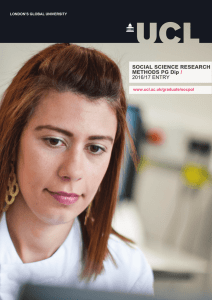SPECIAL AND INCLUSIVE EDUCATION MA / 2016/17 ENTRY
advertisement

LONDON’S GLOBAL UNIVERSITY SPECIAL AND INCLUSIVE EDUCATION MA / 2016/17 ENTRY www.ucl.ac.uk/graduate/psen Special and Inclusive Education MA / The Special and Inclusive Education MA will develop a student's knowledge of key concepts and issues related to special and inclusive education, enhancing their understanding of disciplinary and theoretical perspectives. It will give students the ability to analyse, evaluate and synthesise evidence, theory and practice, and help them to apply conceptual and theoretical frameworks to professional policy and practice. Degree summary By the end of the programme, students should be able to: contribute to contemporary debate in the field of special education and inclusion & disability studies produce and communicate reasoned and informed argument, both in writing and orally demonstrate how concepts, theories and evidence can be used in contracting an understanding of issues and practice carry out a focused inquiry into educational practice related to special and inclusive education improve professional practice through greater knowledge, skills, understanding and awareness // This programme provides students with the opportunity to study in one of the country's leading specialist departments in special educational needs (SEN). disability and educational psychology, working with internationally-recognised tutors who have published widely in the areas of special education, inclusion and disability studies, and who contribute to Master's and doctoral programmes worldwide. // The programme team is committed to creating an intellectually challenging context in which students are encouraged to discuss practical knowledge, experience and ideas in order to extend their understanding of special and inclusive education. // This programme attracts students with rich and varied professional and personal experience, both nationally and internationally, and fellow students provide a valuable networking resource. The MA is taught through lectures, group discussions, small group one-to-one tutorials, and computer lab classes. Compulsory and optional modules are assessed by a 4,000-5,000 word written assignment. Students may choose from a range of assessment titles. In addition, students may choose to write either a report (6,000-7,000 words) or a dissertation (10,000-12,000 words). Degree structure Mode: Full-time: 1 year; Part-time: 2 years; Flexible: up to 4 years Students undertake modules to the value of 180 credits. The programme consists of three core modules (90 credits), optional modules and either a research report (30 credits) or a dissertation (60 credits). CORE MODULES // Concepts and Contexts of Special and Inclusive Education // Research Design and Methodology // In addition students take one module from the following: // Autism: Research and Practice // Inclusive Pedagogy: Changing Practice through Action Research // Language Development // Psychology for Special Needs // Social, Emotional and Behavioural Development in Children with Speech, Language and Communication Needs OPTIONS // Students choose either one or two further options from the list above or, subject to the Programme Leader's approval, from elsewhere at the UCL Institute of Education. DISSERTATION/REPORT // All students undertake an independent research project which culminates in a 10,000 to 12,000-word dissertation or 6,000 to 7,000-word report. Your career Graduates of this programme are currently working across a broad range of areas. Some are working as managers in mainstream and special schools, while others have jobs as special educational needs (SEN) co-ordinators. Graduates can also be found working as staff in specialist services for children with SEN. Recent career destinations* include: // // Tisendel School, Philosophy Teacher // // // Selwyn Primary School, Special Needs Teacher, 2012 The National Foundation for Educational Research, Research Manager, 2012 Tomorrow's Voices, Senior Verbal Behaviour Therapist, 2013 Burnaby Board of Education, British Columbia, Canada, Special Education Teacher, 2013 * data taken from the ‘Destinations of Leavers from Higher Education’ survey undertaken by HESA looking at the destinations of UK and EU students in the 2010–2012 graduating cohorts six months after graduation and, where necessary, departmental records. Entry requirements A minimum of a lower second-class Bachelor's degree in a relevant discipline from a UK university or an overseas qualification of an equivalent standard. Applicants will also normally have some related professional experience. English language proficiency level If your education has not been conducted in the English language, you will be expected to demonstrate evidence of an adequate level of English proficiency. FEES AND FUNDING // UK & EU (2016/17) entry: £7,145 (FT) // Overseas (2016/17) entry: £15,525 (FT) Fees note: Fees for flexible, modular study are charged pro-rata to the appropriate full-time Master's fee taken in an academic session. Full details of funding opportunities can be found on the UCL Scholarships website: www.ucl.ac.uk/scholarships APPLICATION DATE The level of English language proficiency for this programme is: Special. Only the IELTS or a pass to the required standard in the Institute of Education's pre-sessional English (PASHE) course are accepted. If taking IELTS, applicants must obtain an overall grade of 7.0 with a minimum of 6.5 in the reading subtest and 6.0 in the writing subtest.. All applicants: 29 July 2016 Email: k.wall@ucl.ac.uk Information about the evidence required, acceptable qualifications and test providers is provided at: www.ucl.ac.uk/graduate/english-requirements Telephone: +44 (0)20 7612 6282 CONTACT Dr Karl Wall Your application The deadline for all applicants is 29 July 2016. Students are advised to apply as early as possible due to competition for places. Those applying for scholarship funding (particularly overseas applicants) should take note of application deadlines. When we assess your application we would like to learn: // why you want to study Special and Inclusive Education at graduate level // // // why you want to study Special and Inclusive Education at UCL // where you would like to go professionally with your degree what particularly attracts you to the chosen programme how your academic and professional background meets the demands of this challenging programme Together with essential academic requirements, the personal statement is your opportunity to illustrate whether your reasons for applying to this programme match what the programme will deliver. Details on how to apply are available on the website at: www.ucl.ac.uk/graduate/apply PDF Updated: May 26, 2016 Information correct at time of going to press. See website (www.ucl.ac.uk/ioe/departments-centres/departments/psychology-and-human-development) for latest information




